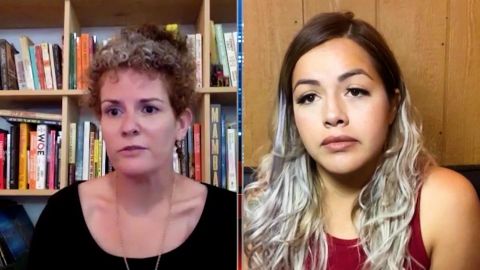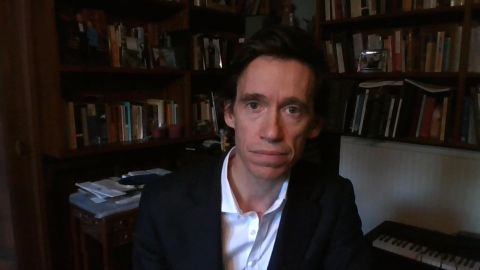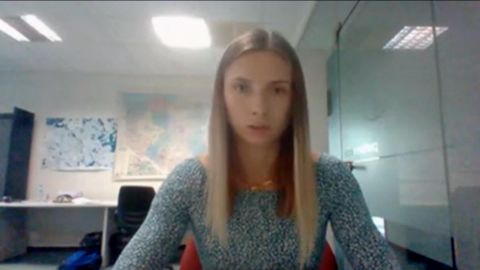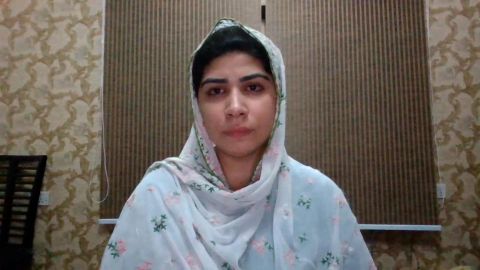Read Transcript EXPAND
BIANNA GOLODRYGA: Well, we turn next to California and those devastating wild fires scorching the state. Our next guest knows what it is like to tackle those blazes. Jessica who is only using her first name for privacy, served as a firefighter in a prison program. Her heartbreaking experience witnessing the death of a fellow inmate firefighter is included in the new book “Breathing Fire” by journalist, Jaime Lowe. Here they both are speaking to Hari Sreenivasan.
(BEGIN VIDEO CLIP)
HARI SREENIVASAN: Bianna, thanks. Jaime Lowe and Jessica, thanks you so much for joining us. Jaime, give us the scale of how widespread this practice is. Right now, we are watching stories of fires ravaging through California. How many inmates are on these lines, male and female, and what sort of work are they doing when we see what we see on TV?
JAIME LOWE, AUTHOR, “BREATHING FIRE”: So, the program is significantly smaller this year because of the pandemic and it was last year also. Usually, it is about 30 percent of the wildland firefighter crews. Right now, I think there is about a thousand, you know, within live flames and about two thousand at camps of incarcerated firefighter crews. I saw a picture of a crew that was clearing areas around a house that was immersed in a Dixie fire. You know, that’s complicated because really homeowners should be responsible for clearing the areas around their houses if they live in high fire risk zones. And it’s not — you know, it shouldn’t necessarily fall to incarcerated crews to be protecting shelters. But they are.
SREENIVASAN: Jessica, when you see all these fires on TV right now that are happening so regularly in California, I think most of us see it from a distance and have never stood on a fire line. So, just tell us a little bit about what goes through your mind when you see this. What is it like to fight a wild fire?
JESSICA, FIREFIGHTER IN PRISON PROGRAM: It is really, really hard. And the — what I can up is like you feel like your feet are on fire. You are panicking at every moment because you feel like you can’t breathe even though, you know, you can breathe. But it feels like you are inhaling this thick smoke. Your captain is constantly like, hurry up, hurry up. They’re expecting you to just be almost like a slave, you know. I know slavery is way worse, but they have you like, hurry up, hurry up, hurry up, like on your toes. And for everything, they want to threaten you with a direct order. You are not listening. I’m going to add time. And if anyone gets injured, I feel bad. I feel bad because sometimes the girls are tired. And you are on the fire and you see these free world staff and they are sitting down. And we’re asking why can’t we sit down. And they are like, no, we have to keep working. We have to keep working. Or if we’re standing still on the mountain, you have to stand up. You cannot sit because even though you have all this weight on you, you have all the (INAUDIBLE) lay backpacks on you. And then, when we eat, we can only eat one time and really fast. And, you know, it is just crazy. I feel so bad for them. And my heart is with them and I pray for them all the time when I see them on the news because I know that it is so hard to be out there.
SREENIVASAN: So, Jessica, just so our audience is probably not familiar. When you say free world, you mean nonincarcerated firefighters. So, you are also clearing all the brush in the first place, you are digging trenches and you are pulling out the roots to try to create fire lines?
JESSICA: Yes. So, what we’re doing is we’re creating bare mineral soil. We’re chopping down all of the trees. We’re taking down all of the stuff. They’re scrapping even the bare dirt to make sure there’s absolutely no type of fuel on the line so that we can try to prevent the fire from jumping over.
SREENIVASAN: And how physically hard is that work when it might be dark, it might be more likely than not uphill, downhill?
JESSICA: It is very hard. And more so when you are tired to the point you are falling asleep working. And that has happened to us couple of occasions. Your — like your body is just so tired. You are trying to go, go. And you are trying to train for the endurance to keep going, but there is a point when your body is just shaky and you feel like, I can’t go no mor but no one can do anything. What are you going to do, tell captain that you are tired? That you’re just going to go? And tell you to keep going or try to add a time. Everyone is in fear walking on egg shells because we don’t want more time. We don’t want to get kicked of camps. We don’t these problems even though we’re humans, we’re tired.
SREENIVASAN: So, Jaime, the program for having inmates work on all of these projects saves the state a ton of money. I mean, these people — give us an idea of what they earn while they are doing this job clearing brush or fighting fires versus what we would be paying firefighters to do?
LOWE: So, when I started reporting, they were earning $256 a day in camp and about $1 to sometimes $2 in the hour on the line. It since been increased to $5 a day in camp, but the hourly wage has not increased. And the CDCR, you know, had on their website the program saves the state $100 million a year. I think, right now, they have 8,000 people. And that includes incarcerated firefighters and (INAUDIBLE) involved and municipal careers are involved. But generally — and this is a problem too, but federal firefighters will make about $38,000 a year, which is so low that it is really hard to recruit for those positions.
SREENIVASAN: This entire book came from you reading a relatively small article in the “Los Angeles Times” about a horrible tragedy at the Malibu Fire.
LOWE: Yes. I was actually home at my mom’s house and I think it was February of 2016 when Shawna Lynn passed away. And there was like a 500- word story in the B section. And I was struck immediately by two things. One, I didn’t even know incarcerated fire camps existed. And I know the mountain, hills, I know those trails, I know the roads, and I had no idea that they were cleared, maintained and preserved by crews. And the other thing that struck me was that Shawna was presented in sort of a two-sentence summary. And it was all related to her crime. And I really just — I wanted to know a little bit more about her. I wanted to know who she was before she was incarcerated. I wanted to know about her family. I wanted to know what it was like for her in camp.
SREENIVASAN: Jessica, you were on the fire line next to Shawna Lynn when the accident happened. If you could just describe what it was. I mean, this is in the middle of the night. You’ve been trekking up and down, over hills, clearing brush. What happened?
JESSICA: So, when we finished our assignment that we were assigned when we first got off the buggy, we’re told that we’re almost done. We might go back to camp where they’re going to — might find some work for us to do. So, the girl before me in line comes up and then Shawna comes up and then she just looks at me said like, wow, this is what I get for wishing for an out of county, right? Because the out of county were like (INAUDIBLE) fires. And I’m like, yes, it’s crazy, huh? So, we’re like just talking about the fire. And as we’re talking about a hundred feet high these like pebbles maybe the size of a dime and quarter falling, and we have about three sets of clothing on, including our (INAUDIBLE) and our fire gear. And we can feel the rocks. I’m holding my chainsaw like this. So, I can feel the rocks hitting me here, here, here. Hitting me. And they hurt. They are coming from a hundred feet high. So, then we’re right there talking and as we’re like discussing about moving or not, the rock — there is a big giant like bolder that comes and just hits Shawna next to me. And immediately, I just started hearing the girls scream. And I turned around and I don’t know. I just — I thought it was like — not a jolt, but I was just like, what is she doing? You know, why is she laying — like I don’t know what why my mind thought that and I just turned around, I’m like, Shawna? And then I see that she’s unresponsive. So, I get closer and like Shawna? Like — and I’m like, get up. And I could see her. And then, that’s when I like start to start to notice that, you know, like blood starts coming out of her ears and her nose, and her lips are getting blue. And the girls are screaming. You know, the girls are like, she’s dead. She got hit. And they are like running to the cliff that we were at where we almost fell, you know. And so, I’m like, hey girls, you know there is a cliff side. Start trying to run that way to help them because the bosses on the top. So, the last two girls that help out with the crew, they’re also trying to give Shawna CPR. When I turned around to like — to see where Shawna was laying down, like she would always wear her chin strap and her helmet was like to the side and her head was split open and lot of blood was coming out. And then the girls were trying to give her CPR but none of the free world staff wanted to touch her because she was an inmate. And the inmates were the one that were trying to give her CPR and Bailey (ph) was trying to tell them how to do it and he called for the helicopter to come down and the helicopter came down and they took Shawna.
SREENIVASAN: I’m so saddened to hear that you had to live through that. And she was almost done with her time. I mean, it adds layers of tragedy to what happened on that slope. So, Jaime, you had a detail in there that even after this tragedy when Shawna is air lifted to a hospital that she was still handcuffed to her gurney. Is that just standard procedure?
LOWE: I believe it is. If you are incarcerated and something happens to you, you are always in a person of the state, who the state is sort of regards you as a prisoner. I became very close with Diana, Shawna’s mom, through the course of reporting. And one of the nurses who was at the hospital told Diana that this was how Shawna was brought to the airport. And I think that, you know, it is enough trauma to lose a daughter. But then to know that that’s how she was transferred, how she was treated and how she was regarded when she was saving the state, she was saving a neighborhood from a fire.
SREENIVASAN: So, is there a reason for these types of programs to continue? I know Governor Gavin Newsom said it’s going to — I think last year, was looking at ways to try to kind of create a pipeline for work from these women and men who were working as firefighters.
LOWE: So, Governor Newsom’s been pretty unclear actually about what exactly that means. He has closed eight camps since in the past year. And that is largely because of the pandemic, because there just aren’t enough numbers of people who are going. He also passed a bill called, which is supposed to expedite expungement for formally incarcerated firefighters. The bill is a step in the right direction but it’s just not nearly enough. It doesn’t guarantee a job. It doesn’t track data to see who is actually benefitting. It doesn’t actually — you know, the agencies who are still looking to hire can see criminal records. And so, there still can be discriminatory practices. And we’re talking about, you know, Cal fire and municipal agencies that have a long history of discrimination.
SREENIVASAN: Jessica, what had fighting these fires or working on these slopes, what did it teach you? Was there anything good that came out of it? Considering that you were feet away from this tragedy that happened to your friend?
JESSICA: Yes, I feel like a lot of good things happened. And, for me, they really brought out my work ethic. They showed me that, you know, after being second (INAUDIBLE), I transitioned to first. So, also, I was lead of the line. And I felt like that was a big responsibility. Because I couldn’t let my crew down. They showed me to have leadership in life. It also showed me how that I could physically push myself, it’s an ability that I never thought that I’d be able to do. And, you know, I feel like it just teaches you how to build good relationships with people that you might not get along with. And also, how to just respect people around you and how to be part of a crew and work.
SREENIVASAN: So, Jaime, that would almost seem like an ad for the program, of the benefits that you can get. So, what kinds of reforms should the California prison system, other prison system make where you can maybe still get some of those benefits that Jessica is talking about without the structure that it has today, where there are such a long list of problems that you detail in the book?
LOWE: Sure. It is one of the reasons why I really wanted to write about the program because it is so nuanced. And everyone I spoke to really did speak to many, many of the benefits, as Jessica mentioned. And there was almost this, like, longing for having been there, not for being imprisoned but that there was a time that was really beneficial and transformative. The thing that is problematic is that they are not paid enough. They should be paid at least minimum wage. There should be a direct link to jobs and a guarantee if somebody wants to pursue it. And there should be more support with it. And they shouldn’t be prisoners while fighting fires. It should be an option that if they are low-level criminals, which is how CDCR couches, you know, the term of the people who can qualify for the program, they should have the option to then go to fire camp, get paid, be part of something like California Conservation Corps or AmeriCorps, but do time in that way. Because I think being a firefighter is one of the hardest, most taxing mentally and physically jobs that is out there right now. And to do that while you are also a prisoner and being, you know, monitored by correctional officers, by being potentially having time added, by having to deal with all of the trauma of being imprisoned, it is just too much. It doesn’t make any sense.
SREENIVASAN: The book is “Breathing Fire.” Author Jaime Lowe and one of the firefighters that was on the line in the Mulholland Fire, Jessica, thanks so much for joining us.
LOWE: Thank you so much.
JESSICA: Thank you.
About This Episode EXPAND
Activist Pashtana Durrani describes the situation on the ground in Afghanistan. Fmr. British MP Rory Stewart reacts to America’s withdrawal from Afghanistan. Exiled Belarusian Olympian Kristina Timanovskaya discusses the dire state of affairs in the country. Jaime Lowe and a formerly incarcerated firefighter discuss the realities of fighting California’s wildfires as an inmate.
LEARN MORE



